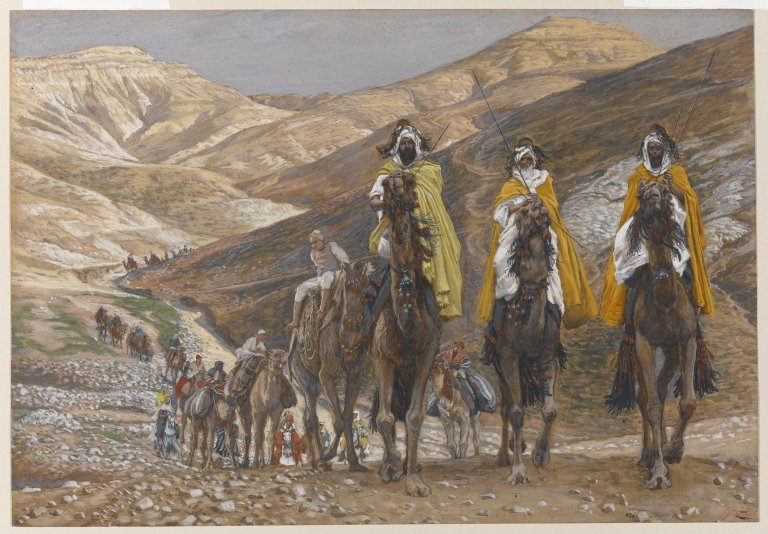Epiphany – the celebration of the manifestation of Christ to the Gentiles as represented by the Wise Men – presents a wonderful capstone to the story of Christmas. Many cultures mark this day with great significance; children in Spain and Latin America receive gifts and have special celebrations, Philippine traditions celebrate the end of Christmas season with church services and in Germany and other parts of Europe children sing, donations are collected and special meals observed.
More than figurines decorating our manger scenes, the wise men illustrate the coming of the nations to worship the God-incarnate… that Jesus came not only for the Jews, but for the whole world. A closer look at prophecies fore-telling their visit and the important role of Abraham’s son Ishmael causes one to awe at the significance of this story.*

It is reported in the gospel of Matthew that “wise men from the East came to Jerusalem, saying ‘Where is he that has been born king of the Jews?’” To the Jewish reader, ‘the East’ nearly always meant the descendants of Ishmael who spread out to the East of the land of Israel into the Arabian desert. Genesis 16 prophesies about Ishmael settling to the East (despite some questionable translation in some English versions), and Gen 25 marks the fulfillment using the same phrase ‘to the East’ as his 12 sons spread out to Eastern lands.
Isaiah tells of this special visit in 60:3-7:
3 Nations will come to your light,
and kings to the brightness of your dawn.4 “Lift up your eyes and look about you:
All assemble and come to you;
your sons come from afar,
and your daughters are carried on the hip.
5 Then you will look and be radiant,
your heart will throb and swell with joy;
the wealth on the seas will be brought to you,
to you the riches of the nations will come.6 Herds of camels will cover your land,
young camels of Midian and Ephah.
And all from Sheba will come,
bearing gold and incense
and proclaiming the praise of the Lord.
7 All Kedar’s flocks will be gathered to you,
the rams of Nebaioth will serve you;
they will be accepted as offerings on my altar,
and I will adorn my glorious temple.
Queen Sheba’s visit to Solomon’s kingdom is certainly in view given the detailed story in 1 Kings 10. Sheba is perhaps a ‘type’ of the magi as she brought her offerings, recognized God’s presence and paid homage to Solomon, a ‘type’ and ancestor of Jesus. Both Sheba and the wise men eagerly sought out the King, hearing of his fame from afar.
The Isaiah 60 prophecy is precise, describing the gold and frankincense that the Eastern kings would bring, gifts known to have their origin in the lands of Arabia. Maalouf notes: “The gifts presented to the King of the Jews by the magi represented Arabian sources of wealth par excellence.” Isaiah is also specific in naming Midian and Ephah (modern day Saudi Arabia), Sheba (modern day Yemen), and the first two sons of Ishmael, Kedar and Nebaioth who settled in modern day Iraq, Jordan and Syria. Isaiah 42 also mentions that Kedar and Sela (The Capital of Edom and modern day Petra in Jordan) will lift up their voices in worship. Incidentally, Muslims trace the lineage of Mohammad to Kedar.
The first of the nations to recognize Jesus as King were descendants of Ishmael. Later in the New Testament story Arabs are present on the day of Pentecost (Acts 2:11, our namesake), some of the first to hear the gospel, and Paul spends his first three years of his ministry to the Gentiles among the descendants of Ishmael (Gal 1:17). Given these Biblical firsts, might we be more hopeful regarding Ishmael’s descendants today? Many myths about Ishmael and his Arab descendants prevail that may need to be challenged perhaps having more to do with recent history and political bias than biblical truth. Insodoing, we may find that those many Christians consider enemies might be drawn to consider the claims of the newborn, incarnate King.
The beauty of Epiphany is that God demonstrates his desire for all nations, classes and social strata to come and worship. He foretold events thousands of years previous, visited lowly Jewish shepherds, spoke to Magi from the East in dreams and interstellar events, inviting all to worship. Might we all pause on this special day, note the nations around us, and invite them also to come and worship the newborn King.
*for a more academic and thorough treatment of the story of Ishmael in the Bible and the Ishmaelite origins of the Wise Men, read Arabs in the Shadow of Israel by Dr. Tony Maalouf. I have relied heavily on his work for this summary.
